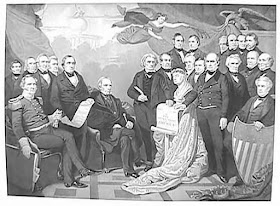
I can't resist juxtaposing these two quotes.
John Caldwell Calhoun, February 4, 1817.
John Pendleton Kennedy, Swallow Barn; or, A Sojourn in the Old Dominion (1832).
Whatever . . . impedes the intercourse of the extremes with this, the centre of the Republic, weakens the Union. The more enlarged the sphere of commercial circulation, the more extended that of social intercourse; the more strongly are we bound together; the more inseparable are our destinies.
Those who understand the human heart best, know how powerfully distance tends to break the sympathies of our nature. Nothing, not even dissimilarity of language, tends more to estrange man from man. Let us then . . . bind the Republic together with a perfect system of roads and canals. Let us conquer space. . . .
John Caldwell Calhoun, February 4, 1817.
“After all,” said he, . . . “I don’t deny that the steamboat is destined to produce valuable results – but after all, I much question . . . if we are not better without it. I declare, I think it strikes deeper at the supremacy of the states than most persons are willing to allow. This annihilation of space, sir, is not to be desired. Our protection against the evils of consolidation consists in the very obstacles to our intercourse. Splatterthwaite Dubbs of Dinwiddie . . . made a good remark – That the home material of Virginia was never so good as when her roads were at their worst.”
John Pendleton Kennedy, Swallow Barn; or, A Sojourn in the Old Dominion (1832).
































